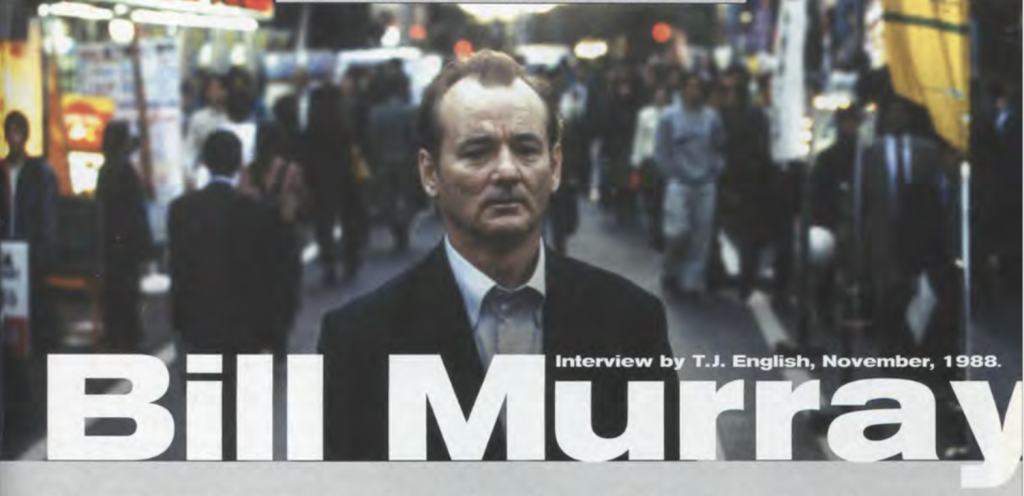Born in Wilmette, Illinois on September B21, 1950, Bill Murray grew up, one of nine children, in an Irish Catholic family (one sister is a Carmelite nun). He left home in the early ’70s to join Chicago’s Second City comedy group and found fame with Saturday Night Live, before conquering Hollywood and becoming one of the most highly regarded actors of the day.
This interview took place in 1988 at Murray’s then new home, a comfortable hideaway that aptly reflected his newfound financial success. T.J. English found Murray to be even funnier in person than he is in his movies. What follows are snippets of conversation that took place between the laughs.
How about the issue of fame? Your life must lose some of its spontaneity.
That’s true. One of my favorite things used to be traffic in New York. There’s a traffic jam and there’s a Cadillac honking or something. I would jump in the middle of the street -I used to do this all the time before I was famous and say, “Excuse me, there’s a Mercedes that has to get through here.” I’d push people out of the way. “Can we get this car out of the way here, there’s a Cadillac that needs to get through,” and just push people out of the way, smacking their cars and stuff. Whack! Just jump into it. You can’t do it now because if you do somebody shouts, “Hey, hey, Meatballs!” The whole thing is lost, the point you were trying to make or whatever fun you wanted to have is undercut.
What was life like growing up in Wilmette?
Wilmette is sort of an affluent place to live, but we were definitely at the bottom of the social register. When you say to people in Chicago you’re from Wilmette, they think you’re the Rockefellers. But we didn’t have the dough. Most of my friends had plenty of money. The idea of college was nothing to them, but not for us. I have five brothers and three sisters. My father died when I was 17. My mother got a job and everybody covered for themselves, if they were big enough, although I wasn’t big enough.
Do you ever find yourself looking back on Second City as the foundation for things you’re doing now?
The thing I learned there was the difference between a good laugh and a cheap laugh. But when I think of learning how to be creative, how to dig into the zeitgeist, turn over new stones, that came later when I was working for National Lampoon. We did a radio show and a live show. That was a strong group of people; we really had a competitive kind of fun. I had quit Second City and hitchhiked to New York to visit Brian [Murray, his brother]. He was working on National Lampoon and they were going to begin this live show. I came in and met the people. They needed someone to work on the Radio Hour, so I slept on my brother’s floor for a while and got the job.
Was it tough following in Chevy Chase’s footsteps on Saturday Night Live?
The first year was almost a complete wash. Dan [Akroyd] actually kept writing me into scenes with him where I would be the second cop. He’d write a scene where two FBI agents would walk in and I’d be one of them. Two cops, two FBI agents, two electricians, that sort of thing. It wasn’t that I had to live up to Chevy’s shadow, because I didn’t feel that from the other actors. But I didn’t know any of the writers, really, and they have to know what you can do before they can write for you. So I didn’t really get cooking until the last show of the season when I wrote something for myself.
Tell me about Tootsie.
I was sort of a concession. I don’t think anybody really wanted me as much as I was a name nobody felt like arguing about. The director said, “I can make anybody look good. Use him!” They thought they had a bomb on their hands. But Tootsie was three times as big as Meatballs, and Meatballs was a serious hit. Tootsie is in a very rar- efied economic world.
Since we’re on the subject of economics, what do you do with all this disposable income you’ve been acquiring?
I recommend to anyone who wants to be rich and famous to be rich first and see if that’s not enough. Because I enjoy being rich a lot more than I enjoy being famous. The only good thing about fame is that I’ve gotten out of a couple of speeding tickets, and I’ve gotten into a restaurant when I didn’t have a suit and tie on. That’s about it.
As for the money, the sort of Elvis Presley thing of buying your mother a car is great. My mother has learned how to spend money. I mean she used to call and say, “Bill, we really need a boiler.” Just for the hell of it, I’d say, “Why don’t you shop around and see which one. Don’t blow a lot of money, just shop around and get a bar- gain. I don’t want you spending senselessly on this boiler. I don’t want a boiler that’s too big for the capacity of the house.” I’d say stuff like that just purely for the devilment of it.


Leave a Reply